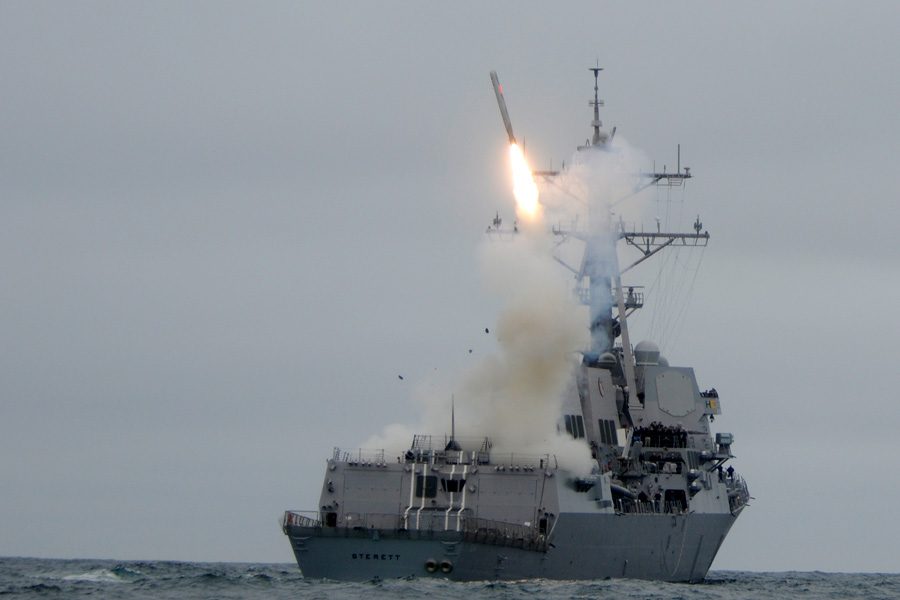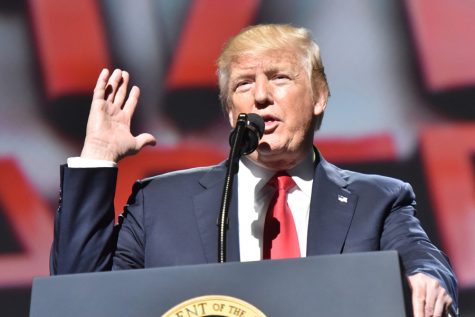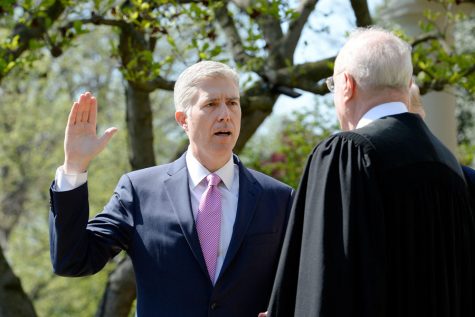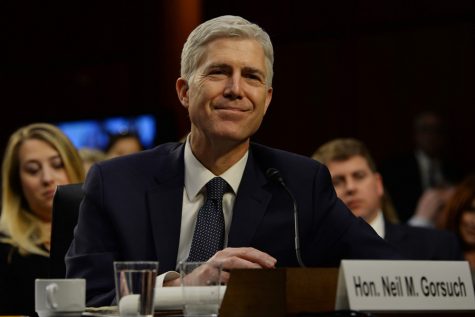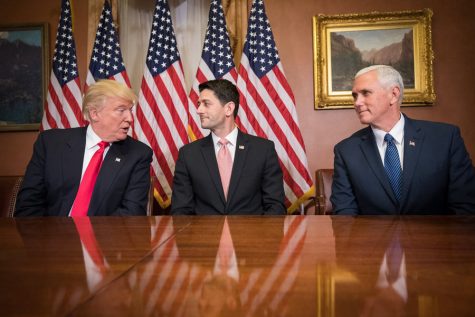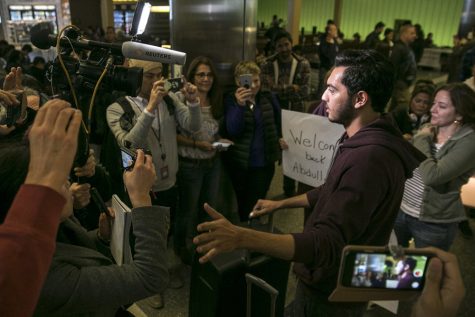Trump orders missile strike on Syrian air base
Guided missile destroyer the USS Sterett launches a Tomahawk missile. President Trump authorized 59 Tomahawk missiles to be launched against a Syrian air base on April 6, 2017. Photo by U.S. Navy
April 7, 2017
Thursday evening, President Trump ordered a military launch of 59 Tomahawk missiles on a Syrian government air base. The launch was purported to be in retaliation to the chemical airstrike on the northern edge of Khan Sheikhoun Tuesday morning which killed at least 86 innocent people, including 26 children.
This airstrike is the first military intervention the US has followed through with under Trump against President Bashar al-Assad and demonstrates Trump’s willingness to take action in response to a government that unjustifiably crosses a boundary.
“It is in this vital national security of the United States to prevent and deter the spread and use of deadly chemical weapons,” President Trump said in a public statement. “There can be no dispute that Syria used banned chemical weapons, violated its obligations under the Chemical Weapons Convention and ignored the urging of the UN Security Council. Years of previous attempts at changing Assad’s behavior have all failed and failed very dramatically.”
In Syria, early Tuesday morning, civilians were subjected to a deadly nerve agent laced within the chemicals that were ordered to be dropped on the city by their President Bashar al-Assad. In the wake of the horrific event are people like Abdul Hamid Youssef, a survivor of the airstrike, who are left without answers and with limited support.
“I went to see my two children, and they had been martyred,” Youssef told CNN. “There was foam around their mouths; there were convulsions.”
It was impossible–something out of a nightmare, for him to be holding his lifeless, 9-month-old twins. This nightmare of Tuesday morning was a reality for so many more including 55-year-old Aisha al-Tilawi, another survivor of the incident.
“We started choking, felt dizzy, then fainted,” al-Tilawi told CNN from a hospital bed, “Three of my family died.”
The survivors of the airstrike who have witnessed countless atrocities as a result of the ongoing, 6 year civil war in Syria, were seemingly defeated Tuesday morning as they woke up in hospital beds and were informed of the escalating body count. Their families had been killed, and at that point, many had lost hope that help would come.
“What international community is this that doesn’t listen to people? Is there even a humanitarian conscience still?” Youssef asked CNN Tuesday morning after the attack, “The US does whatever suits its interests. My children aren’t the first to be martyred.”
The stories, images and videos of the Syrians suffering greatly disturbed President Trump. The President who had, in his inaugural address made it his utmost priority to put “America first” now vowed to make it his responsibility to make efforts to ensure a similar attack does not happen again.
“When you kill innocent children–innocent babies, with a chemical gas, that crosses many many lines. No child of god should ever suffer such horror,” Trump said. “It is now my responsibility.”
However, what this responsibility will entail is still up for questioning. Regardless, the decisions Trump made were in direct response to the chemical attack Tuesday morning. Whether or not the decision to send missiles was indeed the correct response is a matter of opinion.
“I think it was a measured response to what the Syrians had done using chemical weapons this week within their own country,” U.S. History teacher Chuck Zach said. “I use the term measured response [because] you have to think: What did they do? What’s an appropriate response to what they did, and the air base is the place where the attacks had been launched from and so taking out the airbase makes it an appropriate response.”
However, while it may have been the appropriate response, the act against Syria’s military could potentially be viewed as an act of war, and although Syria itself doesn’t have the means to retaliate against the United States, Syria’s allies, such as Russia and Ukraine, have the capability to respond. What happens from here depends on President Trump’s decisions moving forward.
“The president will have to go to Congress for approval for future attacks,” Zach said. “Not just because the Constitution makes Congress responsible to any declarations of war, but because Congress has to pay for it. It’ll be interesting to see how other countries will react and how the president will approach Congress in the future to hand out any retributions to the Syrians.”
Trump has given vague responses as to what his next move is, however, there have been reports of plans to try to stabilize Syria’s government through the Geneva Process.
“We will start a political process to resolve Syria’s future in terms of its governing structure,” Secretary of State Rex Tillerson said in a briefing from a meeting in Morocco Thursday night. “The US hopes to work with international partners to stabilize areas of Syria.”
This is not the first attempt by the United States to try to secure the war torn country of Syria. The country of Syria had experienced a similar chemical airstrike in 2013 in which approximately 1,400 people in Damascus were killed. These attacks were carried out under President Bashar al-Assad’s orders. However, the United States did not attack and instead sent a ship over to destroy the chemicals.
“We struck a deal where we got 100 percent of chemical weapons out,” former Secretary of State John Kerry said during NBC’s Meet the Press in 2014.
These efforts were obviously not carried out effectively as seen in the recent chemical strike Tuesday morning. Overall, the decisions Trump made are not only in the best wishes of the Syrian civilians, but in efforts to protect America’s national security as well from the potential threat of deadly chemical weapons.
“We hope that as long as America stands for justice, that peace and harmony will in the end prevail,” Trump said.


